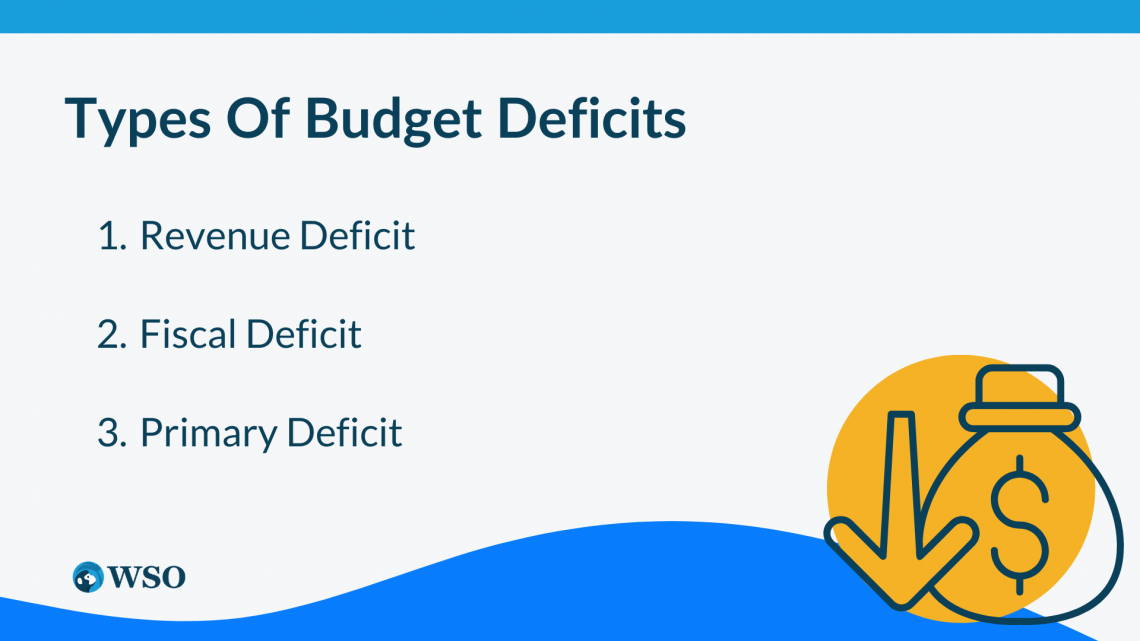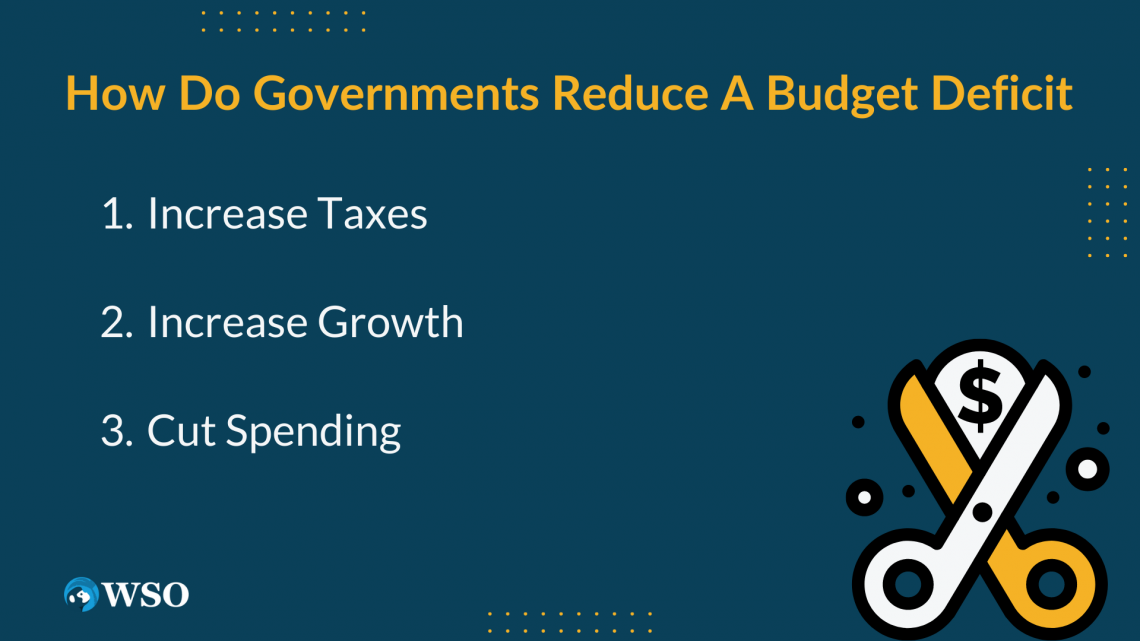Budget Deficit
A budget deficit occurs when a government, organization, or individual's expenses exceed their revenues or income during a specific period of time, typically a fiscal year.
What is a Budget Deficit?
A budget deficit occurs when a government, organization, or individual's expenses exceed their revenues or income during a specific period of time, typically a fiscal year.

You have probably heard of a budget deficit if you follow politics, work for a firm, or hang out with accountants frequently. The concept of a budget deficit is actually quite straightforward: it occurs when spending exceeds income.
The budget deficit occurs when spending exceeds income, i.e., when the total amount of money you spend exceeds the total amount of money you get.
Both small and large scales of this are possible. For instance, if your entire monthly costs exceed your total monthly household income, your household budget may be in deficit.

When operating expenses exceed revenue, businesses have budget shortfalls. The same fundamental idea still holds true: a corporation is in the red because its total revenue is less than what it owes. This can lead to debt, just like it can on an individual basis.
Deficits can also happen at the national and state levels; this was the case in 2009 with the California budget crisis. When it does occur on that scale, it is a matter that is frequently the focus of political discussion.
As we move forward with discussing the national deficit, the principle remains the same: government revenue must be less than government spending
Key Takeaways
- A budget deficit occurs when a government, organization, or individual's expenses exceed their revenues or income during a specific period of time, typically a fiscal year.
- When spending surpasses income, when the entire amount of money you spend exceeds the total amount of money you get in, a budget deficit occurs.
- A deficit can be caused by spending more money than you make, whether you are an individual or a business. However, things can get tricky regarding the government.
- Mandatory expenditures are frequently cited as the cause of the federal budget deficit, but that is just part of the picture.
- If the deficit is high enough, the government may try to decrease funding for crucial programs like Medicare or Social Security.
Types of Budget Deficits
Depending on the types of income and expenses we consider, a budget might have several types of deficits.

1. Revenue Deficit
A government's revenue deficit is the difference between its total revenue expenditures and revenue receipts.
Only the government's revenue expenditures and revenue receipts are relevant. As an alternative, the term "revenue deficit" refers to the difference between total revenue received and total revenue expenditures.
A revenue shortfall means that the government's earnings are insufficient to support the regular operation of its departments and the delivery of services.
Note
A revenue shortfall necessitates borrowing.
Simply explained, a revenue shortfall occurs when the government spends more than it brings in. Remember that only those transactions that have an impact on the government's current income and expenses are included in the revenue shortfall. Put symbols here:
Revenue deficit = Total revenue spent - Total revenue received
2. Fiscal Deficit
A fiscal year's deficit is the difference between the total budgeted expenses and receipts, excluding borrowings. Simply put, it refers to the amount of borrowing the government must resort to paying its expenses.
A huge deficit necessitates a sizable debt load. When the government's resources are insufficient, the fiscal deficit is a measurement of how much it needs to borrow from the market to cover its expenses.
Fiscal deficit = Total expenditure – Total receipts excluding borrowings
3. Primary Deficit
The primary deficit is the current year's deficit minus interest on prior borrowings.
In other words, whereas a fiscal deficit reveals the amount of borrowing necessary, including interest payments, a primary deficit indicates the amount of borrowing necessary, excluding interest payments.
It demonstrates the amount of borrowing the government will use to cover costs other than interest payments.
Note
The government can only borrow money to pay interest if there are no primary deficits.
We must determine the main deficit to know how much debt is being taken out to cover the excess of current expenses over revenues. The fiscal deficit less interest payments is therefore equivalent to the primary deficit.
Primary deficit = Fiscal deficit – Interest payments
What Causes Deficits
A deficit can be caused by spending more money than you make, whether you are an individual or a business. However, things can get tricky regarding the government.

Although the precise causes of a government budget deficit can be difficult to pinpoint, they are typically brought about by low taxes and heavy spending.
Because taxes are the government's main source of income, if such revenue is low, this can indicate that the government's overall income is also low.
Several things can result in national budget deficits, such as:
- Tax reductions that result in lower revenue, such as those designed to increase major businesses' capacity to hire personnel
- Low gross domestic product (the amount of money created in the nation) leads to low overall revenue and tax revenue.
- Faulty tax systems that overtax low-earners and undertax affluent earners
- Hefty military budget
Note
The deficit can occasionally be solved by abolishing a particular expenditure because it is one of its causes.
For instance, the country cannot run without Medicare and Social Security. Government spending usually results in a deficit because spending is much higher than in other sectors, and tax rates are too low to cover what is required to pay for expenses in full.
The Deficit Impact
Although the deficit is often discussed in very abstract terms, there are several consequences that the typical individual might want to be concerned about.

For instance, if the deficit is high enough, the government may try to decrease funding for crucial programs like Medicare or Social Security.
These services may be slashed, resulting in the government's budget decreasing, which may have a significant negative impact on the economy.
Having said that, many individuals are troubled about the recent budget deficit discussions because it is believed that such a deficit will force government agencies to raise federal tax rates.
However, Brookings ultimately concluded that the typical American shouldn't be concerned about the current deficit.
Note
Government bond prices may be affected by budget imbalances.
This is because of an ongoing debate among economists about whether a level of debt can be dangerous to a country's overall economy.
The US economy does not currently appear to be suffering from a deficit. However, nobody knows if that will alter because economists are unsure.
Recent Factors Affecting The Federal Budget Deficit
Mandatory expenditures are frequently cited as the cause of the federal budget deficit, but that is just part of the picture.

The COVID-19 program, tax cuts, mandatory programs (including entitlement programs), and military spending have been the main causes of the present government budget imbalance.
1. Covid-19
Congress passed several laws in March and April 2020 to mitigate the harm caused by the Coronavirus pandemic:
Federal agencies received $8.3 billion from the Coronavirus Preparedness and Response Supplemental Appropriations Act to help them deal with the epidemic.
Paid sick time, insurance coverage for Coronavirus testing, and unemployment payments were all funded with $3.5 billion under the Families First Coronavirus Response Act.
The Coronavirus Aid, Relief, and Economic Security Act (CARES Act) was the biggest, totaling more than $2 trillion.
It provided funding for state and local governments, expanded unemployment insurance, helped small businesses, and distributed $1,200 stimulus cheques to qualified taxpayers.
Note
Also, the 2021 American Rescue Plan gave $1,400 stimulus cheques to people and families and funded COVID-19 testing, immunizations, and other preventative measures.
2. Tax Cuts
Tax reductions cause an immediate drop in revenue and increase the national debt. For instance, between 2001 and 2018, tax cuts by the Bush administration contributed $5.6 trillion to the national debt.
Because the national debt is the accumulation of each year's deficit, there is a connection between it and the federal deficit. As a result, tax cuts annually increase the deficit by decreasing revenue.
The Trump tax cut decreased revenue by decreasing taxes on corporate income, small businesses, and individuals. Based on the Taxation projection, between the years 2018 and 2027, these tax cuts will raise the federal debt by $1.5 trillion.
Note
According to some analysts, tax reductions positively impact the economy, and long-term gains will more than make up for any short-term losses.
The National Bureau of Economic Research discovered that while half of the money from corporate tax cuts may be recovered over time, only 17% of the revenue from income tax cuts may.
3. Unfunded Spending
Congress has mandated spending on several programs without increasing taxes to pay for them.
Some of these are also referred to as "entitlement programs," such as Medicare, where participants have paid taxes into the system while they have been employed. Once they retire, they will be eligible for those benefits.
Medicaid, a mandated program that offers health care to individuals who cannot afford it, is the most expensive. Medicaid cost $521 billion in the 2021 fiscal year.
Note
Medicare costs were estimated to be $709 billion in 2021. In reality, Medicare costs $698 billion in fiscal year 2021.1 Only 40% of its price contributes toward the deficit, though. Payroll taxes and insurance payments cover the remaining 60% of it.
4. Military Spending
Since 2001, the national debt has increased by trillions due to the War on Terror and related defense spending.
The budgets for the Department of Defense and the Department of Veterans Affairs have all been increased as a result. Unfortunately, reducing the budget deficit without reducing American military spending is impossible.
Spending on the military in the United States exceeds the sum of the next ten highest government expenditures.
It is about 3 times as much as China's military spending budget and 10 times as much as Russia's. Due to its magnitude, it significantly impacts the federal budget deficit.
How Do Governments Reduce A Budget Deficit
One thing is certain: the government frequently wants it to go down when the fiscal deficit gets out of hand. And it's currently at its highest point ever.

This has prompted many political parties to propose ideas for lowering the government deficit. Some suggestions for reducing the federal budget deficit are listed below:
1. Increase Taxes
To reduce the deficit, several groups advocate raising taxation at the federal level. This may be done mostly by raising taxes, especially on the wealthy, who are still doing extremely well despite the deficit and recession brought on by the pandemic.
However, because tax increases are frequently unpopular and their proposal can occasionally backfire politically, they have drawbacks for politicians.
2. Increase Growth
The government can raise tax income by promoting economic expansion. People earn more money while the economy is expanding.
Note
When more money is created and becomes taxable, the tax income the government may collect rises. It's challenging to boost growth.
Some people believe that lowering taxes produces economic growth, but there is no proof. Others contend that direct stimulus can be beneficial, but doing so may increase government debt.
3. Cut Spending
Spending reductions can take a variety of forms. Some organizations support spending reductions on social programs, including Social Security, Medicaid, and state-based programs.
Note
You'll probably hear more and more debates about how to lower the debt as it continues to increase. Even if it initially appears to be having no negative effects on the economy or the pocketbook of regular Americans, something will eventually need to be done.
Reviewed and edited by Mohammad Sharjeel Khan | LinkedIn
Free Resources
To continue learning and advancing your career, check out these additional helpful WSO resources:









or Want to Sign up with your social account?